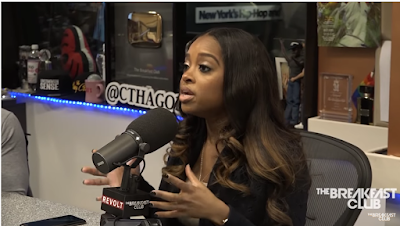Tamika Mallory talks anti-Semitism and why she doesn’t issue condemnations on the Breakfast Club
 |
| Allison Deger – January 18, 2019 |
Women’s March organizer Tamika Mallory was on the Breakfast Club yesterday speaking about the upcoming protest on Saturday, her appearance on the View earlier in the week and anti-Semitism. She covered more ground than in most interviews. This one ran just over 30 minutes.
Mallory spent a fair amount of her time underscoring the reality of anti-Semitism, which she has been accused of by proxy over her ties to Nation of Islam head, minister Louis Farrakhan. In her breakdown, she repeatedly stated anti-Semitism is a present menace in the U.S., and one that has ramifications on black people.
“Anti-semitism is a problem. It’s a real serious problem and it’s one that black folks particularly need to pay attention to because there are forces that want to be able to use anti-black racism and anti-Semitism within the Jewish and black communities to keep us apart because God forbid we pulled our power together and really, really starting working together,” she told interviewers Charlamagne tha God, DJ Envy, and Angela Yee.
“The same white nationalism that Donald Trump stands for is that same white nationalism that seeks to oppress Jews and black people and that is why it is incredibly important for us to find ways for our communities to work together,” she continued.
“Because black and brown folks are so caught up in our own pain when you start trying to put anti-Semitism on us we reject that because we’re like, ‘hey first of all we’re not inherently anti-Semitic or homophobic,’” she said.
Speaking specifically of black Jews and Jews of color, Mallory lamented that those voices haven’t been given the same profile and platform as white Jews in the ongoing conversation.
“[Our] Jewish brother and sisters of color– they are erased as well from their own community and they will tell you that,” she said. “We have to be in relationship with one and another and make sure that black folks and Jews do not become the topic that there is a division between us because we just don’t have any more space for enemies.”
Mallory’s remarks broke through a lot of the sound bites out there where commenters have been disenchanted with her refusal to condemn Farrakhan as a person as opposed to condemning his rhetoric. She’s stated that “his language is not my language” in print interviews and again on the View, but has yet to issue a blanket rebuke. And so she has continuously been asked to be more forceful in her distancing.
She said has been told what words to use. “Condemn” or “denounce” were recommended, which she described as “infantilism where you become a child and people are going to tell you exactly which words to use to describe how you feel about someone in your own community, and that’s something that I reject.”
A follower of Martin Luther King Jr., Mallory noted the civil rights leaders met with both the founder of the Nation of Islam Elijah Muhammad and Malcolm X.
“Guess what, I have not condemned the men who killed my son’s father. I have never denounced them, I have never talked about them in the condemnation context, because I am a person that believes that the person on both side of the gun, the shooter and the victim, they both deserve our love and attention,” she said.
“When I go to a prison and I sit and work with a guy who may have killed someone I’m not going to come out of there and denounce him. That ’s not who I am. What I will do is challenge him and say ‘Hey, I don’t agree with your behavior and want to help you move to a better place so we have a more fair and equitable society.’…That’s who I am and no one can make me different than that.”
When asked if anyone else in the Women’s March leadership, particularly the white women, were ever asked to distance themselves from anyone (perhaps even relatives who voted for Donald Trump), Mallory shook her head no. Later referencing her appearance on the View on Monday where Megan McCain took her to task for refusing to disavow Farrakhan, Mallory alluded to a hypocrisy.
“Based upon the family that Megan McCain comes from, she is the last person that should be trying to tell people who they should and should not denounce.”
One point Mallory didn’t go into detail over but was nonetheless worth noting was the personal harassment she has lived with over the last year. Mallory said she and other leaders of the march have received death threats. “People are trying to contact my son’s school to interfere with his education based up on this. It’s not ok,” she said.


